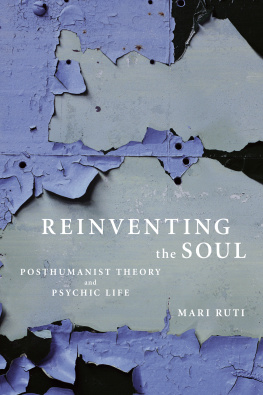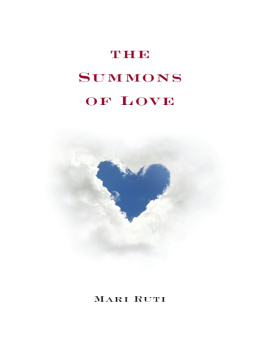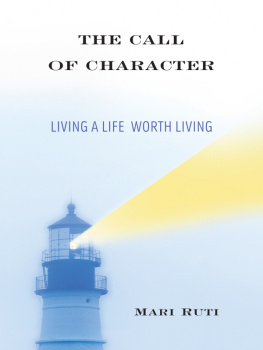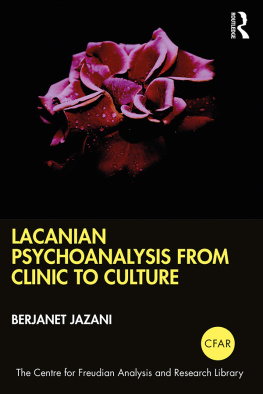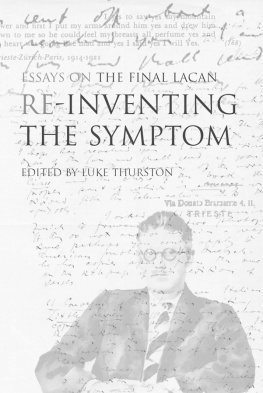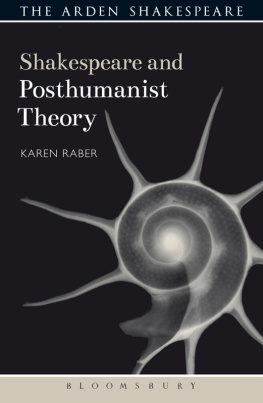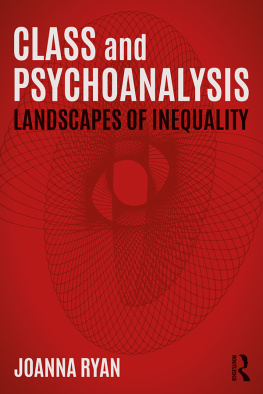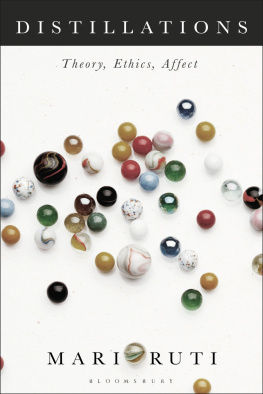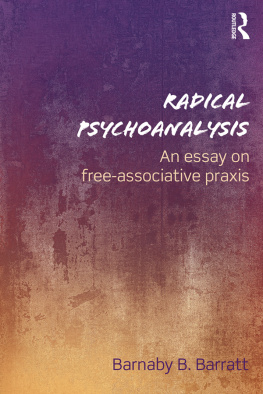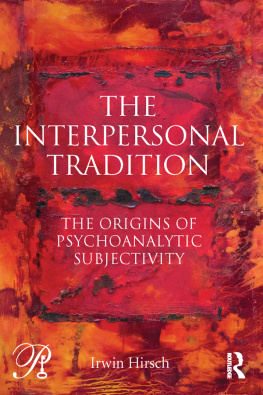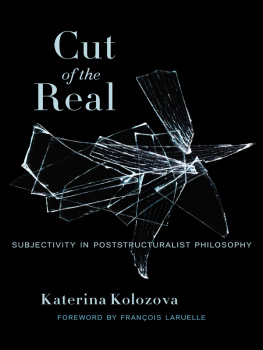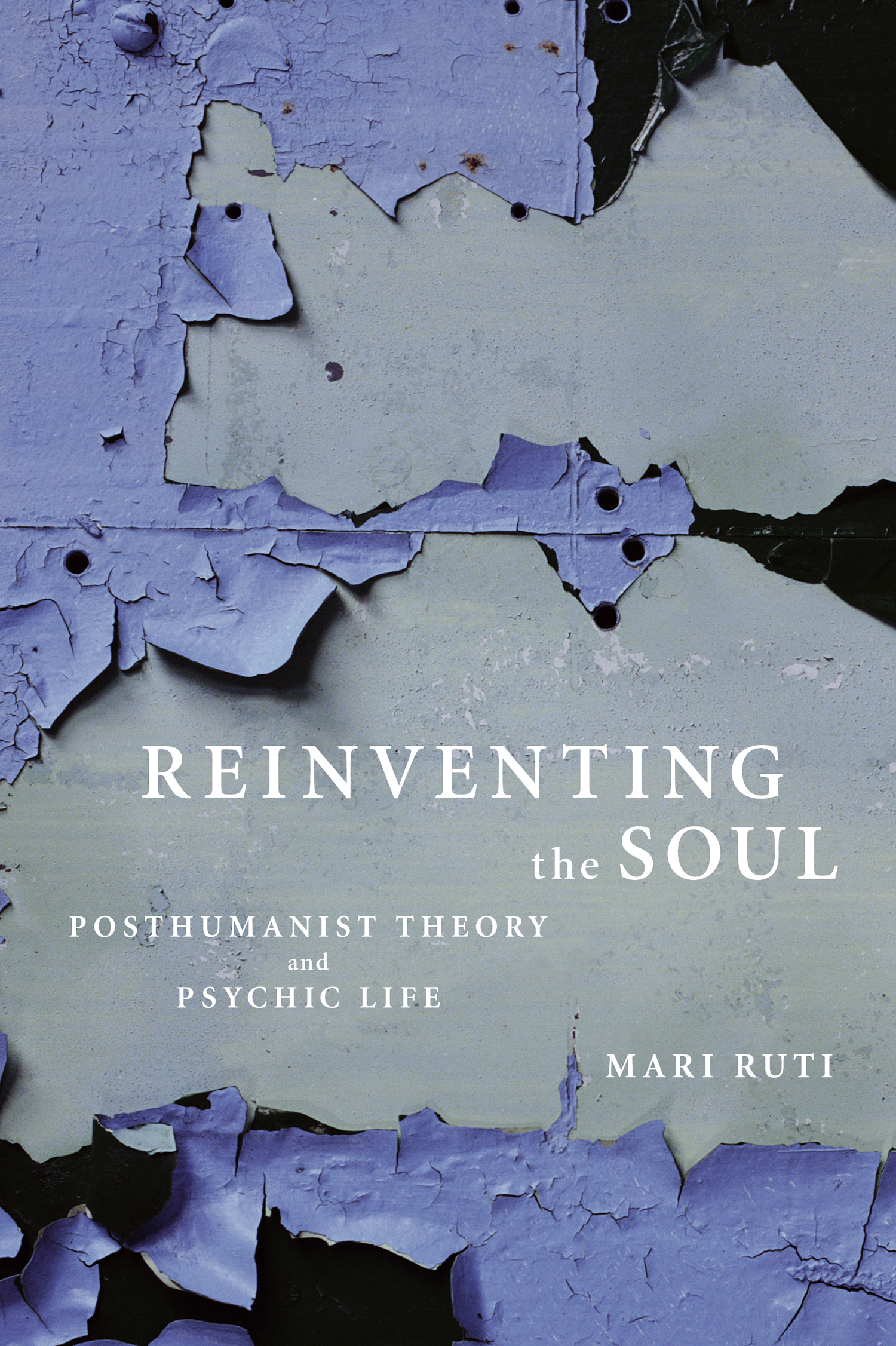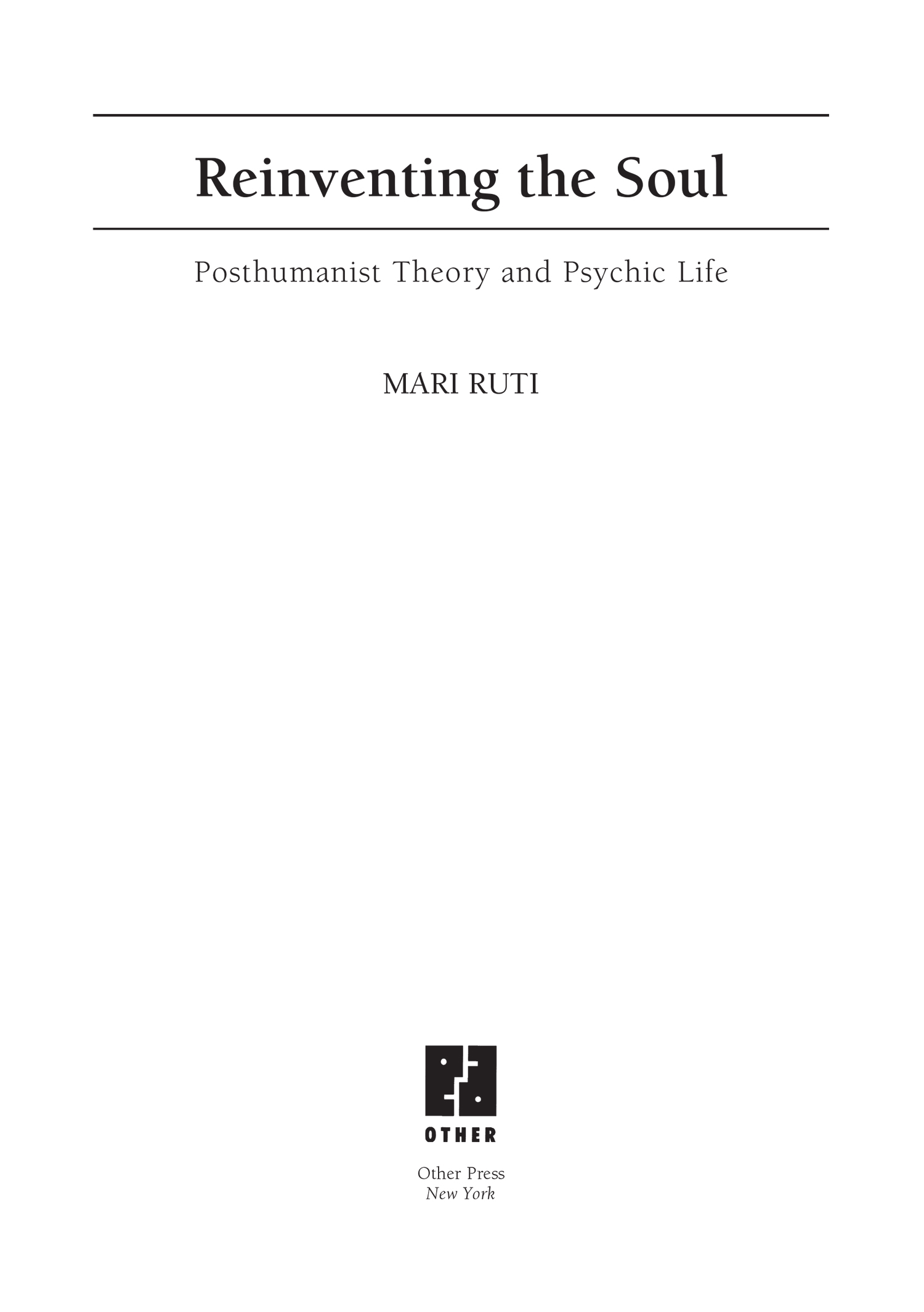Parts of this book appeared in an article entitled From Melancholia to Meaning: How to Live the Past in the Present, Psychoanalytic Dialogues, 15(5):637660, 2005.
Production Editor: Mira S. Park
All rights reserved. No part of this publication may be reproduced or transmitted in any form or by any means, electronic or mechanical, including photocopying, recording, or by any information storage and retrieval system, without written permission from Other Press LLC, except in the case of brief quotations in reviews for inclusion in a magazine, newspaper, or broadcast. For information write to Other Press LLC, 267 Fifth Avenue, 6th Floor, New York, NY 10016. Or visit our Web site: www.otherpress.com
Ruti, Mari.
Reinventing the soul : posthumanist theory and psychic life / Mari Ruti.
p. cm.
Includes bibliographical references and index.
ISBN 1-59051-123-9 (978-1-59051-123-7) (pbk. : alk. paper) 1. Soul. 2. Philosophical anthropology. 3. Poststructuralism. 4. Parapsychology. I. Title.
Acknowledgments
Many individuals have contributed to my ability to complete this project. My most profound gratitude belongs to Judith Feher-Gurewich who, like the fairy godmother with the magic wand, brought this book into existence from what in retrospect seems like a disjointed conglomerate of notes and fragments. It is Judiths unparalleled understanding of, and passion for, Lacanian psychoanalysis, as well as her keen and uncanny capacity to repeatedly hand me the missing piece of the riddle, that have made this book what it is. I feel infinitely fortunate in having received such dedicated and personalized attention in the conceptualization of my first book. Needless to say, all errors and misjudgments are my own.
I also want to thank my long-term advisor, colleague, and friend, Alice Jardine, who had faith in this project already when I did not myself yet have a clear sense of where I was headed. Alices trust in the convoluted workings of my mind, and her encouragement in the early days of the project when it was all too easy to lose confidence, made all the difference in the world. David Eng, who read two different versions of the entire manuscript, and whose patient and insightful comments proved more helpful than I can express, taught me that it is possible to gracefully combine a dazzling intellect with the kind of spirit of generosity that represents the best of what academia has to offer.
My colleagues at the Harvard Committee on Degrees on Studies of Women, Gender, and SexualityKathy Coll, Brad Epps, Afsaneh Najmabadi, Katy Park, Juliet Schor, and Kath Westonhave taught me the true meaning of loyalty, collegiality, and mentorship. Without their unfailing support and sound advice I would have never been able to finish this book, let alone flourish as a newly minted intellectual. I am also grateful to Nancy Banks, Steph Gauchel, and Christianna Morgan who, through their efficient reliability and consistent good cheer, helped me carve out the mental space that I needed to finalize this book.
Many thanks also to my new colleagues at the University of Toronto English Departmentparticularly Michael Cobb, Jeannine DeLombard, Neil Dolan, Alexandra Gillespie, Colin Hill, Linda Hutcheon, Mark Levene, and Dan Whitefor allowing me to retreat into my writing in the first few months of my appointment (when I really should have been fully and enthusiastically present). I also wish to thank Teresa Brennan for her encouraging comments, Eric Downing for Nietzsche and for giving me my first deep thrill of intellectual excitement, Barbara Johnson for her inimitable aura that compels one (despite oneself) to try even harder, Julia Kristeva for teaching me to appreciate the clinical side of psychoanalysis, Lynne Layton for providing an example of a truly well-rounded intellectual, David Plunkett for endless conversations about Heidegger and Foucault, Jessica Rosenberg for gently nudging me to write more precisely, and Michael Tan for his thoughtful assistance with the first draft of this book. I am deeply indebted to Nico Carbellano for years of theory-talk and laughter (who knew that theory could be so funny?), for her humbling brilliance, and for her priceless suggestions in the final stages of this project. Thanks also to Stacy Hague, Elaine Lindenblatt, and Mira Park at Other Press for their constructive editorial assistance.
The following individuals made my life possible during the time that it took me to write this book: Megan Boler, Sean Carroll, Doreen Drury, Michael Knisley, Marjorie McClung, Jennie McKnight, Noriko Murai, Richard Ogden, Stephanie Poggi, Jean Russo, Bob Samiljan, Shauna Shames, Melina Shannon-DiPietro, Josh Viertel, and Billy Yeskel. You have been my rock, my raft, and my lifelineI owe you everything. Thanks also to Katia Dianina, Melissa Feuerstein, Francine Latil, Louisa Shea, and Rebecca Wingfield for many evenings of much-needed frivolity and lightness. Special thanks to Maggie Schmitt who, in her enigmatic way, induced me to write this book.
This book arises from and tries to articulate something fundamental about the leap that I have made from a working-class background without books, learning, or running water to a Harvard Ph.D. (and beyond). The distance that lies between the three-house village in southern Finland where I grew up and the life that I now lead is incomprehensible, even to me. I would consequently like to thank my parents, Jukka and Ritva Ruti, for not having ever asked for explanations. They have worked harder than anyone should need to so that I could roam free. I have written this book in part to justifyand to have something concrete to show forthe fact that I was given the kinds of opportunities that they never had. This is the kind of debt that only grows larger with the passage of time.
Mari Ruti
March 1, 2006
Preface
This is a book about psychic life from a posthumanist perspective. It arises from my conviction that posthumanist theoryby which I mean French poststructuralism, Lacanian psychoanalysis, and their multiple derivativescontains a great deal more insight about the affirmative potentialities of the psyche than is commonly acknowledged. My objective is to unearth the creative and transformative dimensions of posthumanist theory so as to arrive at a better understanding of what it means to live in the world as a creature of consciousness, as a creature who possesses the capacity to contemplate the meaning of life and the immanence of death, and to ask itself what makes its life worth living. For the most part, we tendI certainly doto go about our daily activities in ways that prevent us from fully experiencing the world. We spend much of our lives ignoring the issues that matter to us the most, either because such issues seem too difficult to face directly, or because we keep chasing the elusive and magical momentthat perfect calm in the eye of the stormthat we imagine will allow us to regather our scattered selves for long enough to be able to focus our energies. Similarly, we spend much of our lives ignoring the detailsthe way raindrops play upon the calm surface of a lake, the hundred shades of green upon a hillside, or the perfect line of a lovers collarbonethat make up our daily realities. It is almost as if the impossibility of living passionately in the present was built into the very structure of our lives, making it difficult to remain cognizant of the fact that life is not a mere prelude to another existence that might allow us to think about and experience all the things that we do not have time to think about and experience at present, but rather our sole chance to do all the thinking and experiencing that we wish to engage in.

